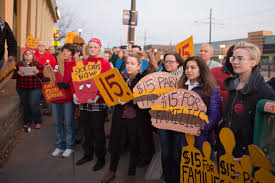In April 2024, Governor Newsom signed a bill that raised the minimum wage for all California fast food restaurant and healthcare employees from $16 to $20. However, this increase did not extend to other industries.
California has over 500,000 workers working in the fast food industry with 30% being teenagers, according to the Center for Economic and Policy Research. With a number of students currently employed in the job industry, this change has been met with some mixed reactions.
“I [took on a job] because I wanted to raise money for a car. I think having 20 [dollars] an hour really shortens my time frame to get that car so it helps me reach your goals faster,” senior Daniel Shang, a worker at Jersey Mike’s, said.
Although this change has been well-received by workers, there are also negative effects that come with it. According to USA Today, “chains such as Chipotle and McDonald’s have already said they plan to raise menu prices as a way to offset the costs of higher wages in California.”
“Honestly, I didn’t really think I needed the raise because McDonald’s pays a decent amount;it was just a bonus,” senior Izel Candia, an employee at McDonald’s, said. “But the managers are probably feeling more pressure to make sure our stores are running smoothly, and so there’s more risk for a layoff and shorter hours.”
USA Today also reports problems that may come with an increased minimum wage include reduced operating hours, price increases and potential job loss. Since the raise in minimum wage doesn’t affect everyone in the work industry, some students working in other businesses have expressed their concerns.
“At first I was kind of upset about it because obviously I want the $20, but I think it’s fine because in our job, we get really big tips,” senior Rainier Masangkay, a worker at Afters Ice Cream, said. “One time, I made $90 in a day just from tips and we get paid $17 so it’s equivalent to $20. But I think if it was like $20 plus the tip, I’d appreciate it.”
Raises in salary are expected to occur in other industries as businesses struggle to keep up with the shifting labor market.
“I think it should have been a universal change because I believe you put in the same amount of work as other people so I think [the raise] should have been for everybody,” Candia said.







